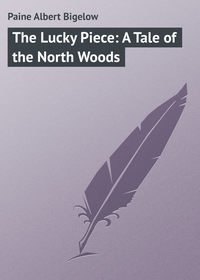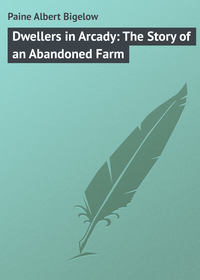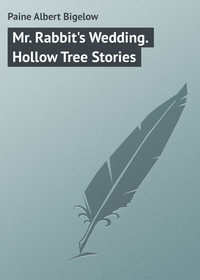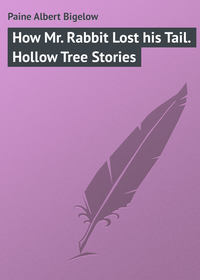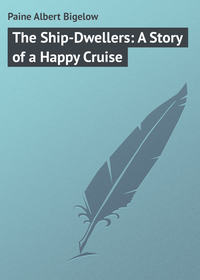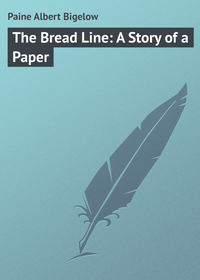 полная версия
полная версияMark Twain: A Biography. Volume II, Part 2: 1886-1900
He went on to describe his appreciation in detail, and when the drawings were complete he wrote again:
Hold me under permanent obligations. What luck it was to find you! There are hundreds of artists who could illustrate any other book of mine, but there was only one who could illustrate this one. Yes, it was a fortunate hour that I went netting for lightning-bugs and caught a meteor. Live forever!
This was not too much praise. Beard realized the last shade of the author's allegorical intent and portrayed it with a hundred accents which the average reader would otherwise be likely to miss.
Clemens submitted his manuscript to Howells and to Stedman, and he read portions of it, at least, to Mrs. Clemens, whose eyes were troubling her so that she could not read for herself. Stedman suggested certain eliminations, but, on the whole, would seem to have approved of the book. Howells was enthusiastic. It appealed to him as it had appealed to Beard. Its sociology and its socialism seemed to him the final word that could be said on those subjects. When he had partly finished it he wrote:
It's a mighty great book and it makes my heart, burn with wrath. It seems that God didn't forget to put a soul in you. He shuts most literary men off with a brain, merely.
A few days later he wrote again:
The book is glorious-simply noble. What masses of virgin truth never touched in print before!
And when he had finished it:
Last night I read your last chapter. As Stedman says of the whole book, it's titanic.
Clemens declared, in one of his replies to Howells:
I'm not writing for those parties who miscall themselves critics, and I don't care to have them paw the book at all. It's my swan song, my retirement from literature permanently, and I wish to pass to the cemetery unclodded . . . . Well, my book is written—let it go, but if it were only to write over again there wouldn't be so many things left out. They burn in me; they keep multiplying and multiplying, but now they can't ever be said; and besides they would require a library—and a pen warmed up in hell.
In another letter of this time to Sylvester Baxter, apropos of the tumbling Brazilian throne, he wrote:
When our great brethren, the disenslaved Brazilians, frame their declaration of independence I hope they will insert this missing link: "We hold these truths to be self-evident—that all monarchs are usurpers and descendants of usurpers, for the reason that no throne was ever set up in this world by the will, freely exercised, of the only body possessing the legitimate right to set it up—the numerical mass of the nation."
He was full of it, as he had been all along, and 'A Connecticut Yankee in King Arthur's Court' is nothing less than a brief for human rights and human privileges. That is what it is, and it is a pity that it should be more than that. It is a pity that he should have been beset by his old demon of the burlesque, and that no one should have had the wisdom or the strength to bring it under control.
There is nothing more charming in any of Mark Twain's work than his introductory chapter, nothing more delightful than the armoring of the Yankee and the outset and the wandering with Alisande. There is nothing more powerful or inspiring than his splendid panoramic picture—of the King learning mercy through his own degradation, his daily intercourse with a band of manacled slaves; nothing more fiercely moving than that fearful incident of the woman burned to warm those freezing chattels, or than the great gallows scene, where the priest speaks for the young mother about to pay the death penalty for having stolen a halfpenny's worth, that her baby might have bread. Such things as these must save the book from oblivion; but alas! its greater appeal is marred almost to ruin by coarse and extravagant burlesque, which destroys illusion and antagonizes the reader often at the very moment when the tale should fill him with a holy fire of a righteous wrath against wrong. As an example of Mark Twain at his literary worst and best the Yankee ranks supreme. It is unnecessary to quote examples; one cannot pick up the volume and read ten pages of it, or five pages, without finding them. In the midst of some exalted passage, some towering sublimity, you are brought suddenly to earth with a phrase which wholly destroys the illusion and the diviner purpose. Howells must have observed these things, or was he so dazzled by the splendor of its intent, its righteous charge upon the ranks of oppression, that he regarded its offenses against art as unimportant. This is hard to explain, for the very thing that would sustain such a great message and make it permanent would be the care, the restraint, the artistic worthiness of its construction. One must believe in a story like that to be convinced of its logic. To lose faith in it—in its narrative—is absolutely fatal to its purpose. The Yankee in King Arthur's Court not only offended the English nation, but much of it offended the better taste of Mark Twain's own countrymen, and in time it must have offended even Mark Twain himself. Reading it, one can visualize the author as a careering charger, with a bit in his teeth, trampling the poetry and the tradition of the romantic days, the very things which he himself in his happier moods cared for most. Howells likened him to Cervantes, laughing Spain's chivalry away. The comparison was hardly justified. It was proper enough to laugh chivalry out of court when it was a reality; but Mark Twain, who loved Sir Thomas Malory to the end of his days, the beauty and poetry of his chronicles; who had written 'The Prince and the Pauper', and would one day write that divine tale of the 'Maid of Orleans'; who was himself no more nor less than a knight always ready to redress wrong, would seem to have been the last person to wish to laugh it out of romance.
And yet, when all is said, one may still agree with Howells in ranking the Yankee among Mark Twain's highest achievements in the way of "a greatly imagined and symmetrically developed tale." It is of that class, beyond doubt. Howells goes further:
Of all the fanciful schemes in fiction it pleases me most, and I give myself with absolute delight to its notion of a keen East Hartford Yankee finding himself, by a retroactionary spell, at the court of King Arthur of Britain, and becoming part of the sixth century with all the customs and ideas of the nineteenth in him and about him. The field for humanizing satire which this scheme opens is illimitable.
Colossal it certainly is, as Howells and Stedman agreed: colossal in its grotesqueness as in its sublimity. Howells, summarizing Mark Twain's gifts (1901), has written:
He is apt to burlesque the lighter colloquiality, and it is only in the more serious and most tragical junctures that his people utter themselves with veracious simplicity and dignity. That great, burly fancy of his is always tempting him to the exaggeration which is the condition of so much of his personal humor, but which when it invades the drama spoils the illusion. The illusion renews itself in the great moments, but I wish it could be kept intact in the small, and I blame him that he does not rule his fancy better.
All of which applies precisely to the writing of the Yankee in King Arthur's Court. Intended as a fierce heart-cry against human injustice —man's inhumanity to man—as such it will live and find readers; but, more than any other of Mark Twain's pretentious works, it needs editing —trimming by a fond but relentless hard.
CLXXII
THE "YANKEE" IN ENGLAND
The London publishers of the Yankee were keenly anxious to revise the text for their English readers. Clemens wrote that he had already revised the Yankee twice, that Stedman had critically read it, and that Mrs. Clemens had made him strike out many passages and soften others. He added that he had read chapters of it in public several times where Englishmen were present and had profited by their suggestions. Then he said:
Now, mind you, I have taken all this pains because I wanted to say a Yankee mechanic's say against monarchy and its several natural props, and yet make a book which you would be willing to print exactly as it comes to you, without altering a word.
We are spoken of (by Englishmen) as a thin-skinned people. It is you who are thin-skinned. An Englishman may write with the most brutal frankness about any man or institution among us and we republish him without dreaming of altering a line or a word. But England cannot stand that kind of a book written about herself. It is England that is thin-skinned. It causeth me to smile when I read the modifications of my language which have been made in my English editions to fit them for the sensitive English palate.
Now, as I say, I have taken laborious pains to so trim this book of offense that you'll not lack the nerve to print it just as it stands. I am going to get the proofs to you just as early as I can. I want you to read it carefully. If you can publish it without altering a single word, go ahead. Otherwise, please hand it to J. R. Osgood in time for him to have it published at my expense.
This is important, for the reason that the book was not written for America; it was written for England. So many Englishmen have done their sincerest best to teach us something for our betterment that it seems to me high time that some of us should substantially recognize the good intent by trying to pry up the English nation to a little higher level of manhood in turn.
So the Yankee was published in England just as he had written it,—[The preface was shortened and modified for both the American and English editions. The reader will find it as originally written under Appendix S, at the end of last volume.]—and the criticisms were as plentiful as they were frank. It was referred to as a "lamentable failure" and as an "audacious sacrilege" and in terms still less polite. Not all of the English critics were violent. The Daily Telegraph gave it something more than a column of careful review, which did not fail to point out the book's sins with a good deal of justice and dignity; but the majority of English papers joined in a sort of objurgatory chorus which, for a time at least, spared neither the author nor his work. Strictures on the Yankee extended to his earlier books. After all, Mark Twain's work was not for the cultivated class.
These things must have begun to gravel Clemens a good deal at last, for he wrote to Andrew Lang at considerable length, setting forth his case in general terms—that is to say, his position as an author—inviting Lang to stand as his advocate before the English public. In part he said:
The critic assumes every time that if a book doesn't meet the cultivated-class standard it isn't valuable . . . The critic has actually imposed upon the world the superstition that a painting by Raphael is more valuable to the civilizations of the earth than is a chromo; and the august opera more than the hurdy-gurdy and the villagers' singing society; and the Latin classics than Kipling's far-reaching bugle-note; and Jonathan Edwards than the Salvation Army . . . . If a critic should start a religion it would not have any object but to convert angels, and they wouldn't need it. It is not that little minority who are already saved that are best worth lifting up, I should think, but the mighty mass of the uncultivated who are underneath! That mass will never see the old masters—that sight is for the few; but the chromo-maker can lift them all one step upward toward appreciation of art; they cannot have the opera, but the hurdy-gurdy and the singing-class lift them a little way toward that far height; they will never know Homer, but the passing rhymester of their day leaves them higher than he found them; they may never even hear of the Latin classics, but they will strike step with Kipling's drum-beat and they will march; for all Jonathan Edwards's help they would die in their slums, but the Salvation Army will beguile some of them to a purer air and a cleaner life.
I have never tried, in even one single little instance, to help cultivate the cultivated classes. I was not equipped for it either by native gifts or training. And I never had any ambition in that direction, but always hunted for bigger game—the masses. I have seldom deliberately tried to instruct them, but I have done my best to entertain them, for they can get instruction elsewhere . . . . My audience is dumb; it has no voice in print, and so I cannot know whether I have won its approval or only got its censure.
He closed by asking that Lang urge the critics to adopt a rule recognizing the masses, and to formulate a standard whereby work done for them might be judged. "No voice can reach further than yours in a case of this kind," he said, "or carry greater weight of authority." There was no humor in this letter, and the writer of it was clearly in earnest.
Lang's response was an article published in the Illustrated London News on the art of Mark Twain. He began by gently ridiculing hyperculture —the new culture—and ended with a eulogy on Huck Finn. It seems worth while, however, to let Andrew Lang speak for himself.
I have been educated till I nearly dropped; I have lived with the earliest apostles of culture, in the days when Chippendale was first a name to conjure with, and Japanese art came in like a raging lion, and Ronsard was the favorite poet, and Mr. William Morris was a poet, too, and blue and green were the only wear, and the name of Paradise was Camelot. To be sure, I cannot say that I took all this quite seriously, but "we, too, have played" at it, and know all about it. Generally speaking, I have kept up with culture. I can talk (if desired) about Sainte-Beuve, and Merimee, and Felicien Rops; I could rhyme "Ballades" when they were "in," and knew what a "pantoom" was . . . . And yet I have not culture. My works are but tinkling brass because I have not culture. For culture has got into new regions where I cannot enter, and, what is perhaps worse, I find myself delighting in a great many things which are under the ban of culture.
He confesses that this is a dreadful position; one that makes a man feel like one of those Liberal politicians who are always "sitting on the fence," and who follow their party, if follow it they do, with the reluctant acquiescence of the prophet's donkey. He further confesses that he has tried Hartmann and prefers Plato, that he is shaky about Blake, though stalwart concerning Rudyard Kipling.
This is not the worst of it. Culture has hardly a new idol but I long to hurl things at it. Culture can scarcely burn anything, but I am impelled to sacrifice to that same. I am coming to suspect that the majority of culture's modern disciples are a mere crowd of very slimly educated people who have no natural taste or impulses; who do not really know the best things in literature; who have a feverish desire to admire the newest thing, to follow the latest artistic fashion; who prate about "style," without the faintest acquaintance with the ancient examples of style in Greek, French, or English; who talk about the classics and—criticize the classical critics and poets, without being able to read a line of them in the original. Nothing of the natural man is left in these people; their intellectual equipment is made up of ignorant vanity and eager desire for novelty, and a yearning to be in the fashion. Take, for example—and we have been a long time in coming to him—Mark Twain. [Here follow some observations concerning the Yankee, which Lang confesses that he has not read, and has abstained from reading because–]. Here Mark Twain is not, and cannot be, at the proper point of view. He has not the knowledge which would enable him to be a sound critic of the ideals of the Middle Ages. An Arthurian Knight in New York or in Washington would find as much to blame, and justly, as a Yankee at Camelot.
Of Mark Twain's work in general he speaks with another conclusion:
Mark Twain is a benefactor beyond most modern writers, and the cultured who do not laugh are merely to be pitied. But his art is not only that of the maker of the scarce article—mirth. I have no hesitation in saying that Mark Twain is one among the greatest contemporary makers of fiction . . . . I can never forget or be ungrateful for the exquisite pleasure with which I read Huckleberry Finn for the first time years ago. I read it again last night, deserting Kenilworth for Huck. I never laid it down till I had finished it. I perused several passages more than once, and rose from it with a higher opinion of its merits than ever.
What is it that we want in a novel? We want a vivid and original picture of life; we want character naturally displayed in action; and if we get the excitement of adventure into the bargain, and that adventure possible and plausible, I so far differ from the newest school of criticism as to think that we have additional cause for gratitude. If, moreover, there is an unstrained sense of humor in the narrator we have a masterpiece, and Huckleberry Finn is, nothing less.
He reviews Huck sympathetically in detail, and closes:
There are defects of taste, or passages that to us seem deficient in taste, but the book remains a nearly flawless gem of romance and of humor. The world appreciates it, no doubt, but "cultured critics" are probably unaware of its singular value. The great American novel has escaped the eyes of those who watch to see this new planet swim into their ken. And will Mark Twain never write such another? One is enough for him to live by, and for our gratitude, but not enough for our desire.
In the brief column and a half which it occupies, this comment of Andrew Lang's constitutes as thoughtful and fair an estimate of Mark Twain's work as was ever written.
W. T. Stead, of the Review of Reviews, was about the only prominent English editor to approve of the Yankee and to exploit its merits. Stead brought down obloquy upon himself by so doing, and his separation from his business partner would seem to have been at least remotely connected with this heresy.
The Yankee in King Arthur's Court was dramatized in America by Howard Taylor, one of the Enterprise compositors, whom Clemens had known in the old Comstock days. Taylor had become a playwright of considerable success, with a number of well-known actors and actresses starring in his plays. The Yankee, however, did not find a manager, or at least it seems not to have reached the point of production.
CLXXIII
A SUMMER AT ONTEORA
With the exception of one article—"A Majestic Literary Fossil" —[Harper's Magazine, February, 1890. Included in the "Complete Works."] —Clemens was writing nothing of importance at this time. This article grew out of a curious old medical work containing absurd prescriptions which, with Theodore Crane, he had often laughed over at the farm. A sequel to Huckleberry Finn—Huck Finn and Tom Sawyer Among the Indians —was begun, and a number of its chapters were set in type on the new Paige compositor, which had cost such a gallant sum, and was then thought to be complete. There seems to have been a plan to syndicate the story, but at the end of Chapter IX Huck and Tom had got themselves into a predicament from which it seemed impossible to extricate them, and the plot was suspended for further inspiration, which apparently never came.
Clemens, in fact, was troubled with rheumatism in his arm and shoulder, which made writing difficult. Mrs. Clemens, too, had twinges of the malady. They planned to go abroad for the summer of 1890, to take the waters of some of the German baths, but they were obliged to give up the idea. There were too many business complications; also the health of Clemens's mother had become very feeble. They went to Tannersville in the Catskills, instead—to the Onteora Club, where Mrs. Candace Wheeler had gathered a congenial colony in a number of picturesque cottages, with a comfortable hotel for the more transient visitor. The Clemenses secured a cottage for the season. Mrs. Mary Mapes Dodge, Laurence Hutton, Carroll Beckwith, the painter; Brander Matthews, Dr. Heber Newton, Mrs. Custer, and Dora Wheeler were among those who welcomed Mark Twain and his family at a generous home-made banquet.
It was the beginning of a happy summer. There was a constant visiting from one cottage to another, with frequent assemblings at the Bear and Fox Inn, their general headquarters. There were pantomimes and charades, in which Mark Twain and his daughters always had star parts. Susy Clemens, who was now eighteen, brilliant and charming, was beginning to rival her father as a leader of entertainment. Her sister Clara gave impersonations of Modjeska and Ada Rehan. When Fourth of July came there were burlesque races, of which Mark Twain was starter, and many of that lighthearted company took part. Sometimes, in the evening, they gathered in one of the cottages and told stories by the firelight, and once he told the story of the Golden Arm, so long remembered, and brought them up with the same old jump at the sudden climax. Brander Matthews remembers that Clemens was obliged frequently to go to New York on business connected with the machine and the publishing, and that during one of these absences a professional entertainer came along, and in the course of his program told a Mark Twain story, at which Mrs. Clemens and the girls laughed without recognizing its authorship. Matthews also remembers Jean, as a little girl of ten, allowed to ride a pony and to go barefoot, to her great delight, full of health and happiness, a favorite of the colony.
Clemens would seem to have forgiven Brander Matthews for his copyright articles, for he walked over to the Matthews cottage one morning and asked to be taught piquet, the card game most in vogue there that season. At odd times he sat to Carroll Beckwith for his portrait, and smoked a cob pipe meantime, so Beckwith painted him in that way.
It was a season that closed sadly. Clemens was called to Keokuk in August, to his mother's bedside, for it was believed that her end was near. She rallied, and he returned to Onteora. But on the 27th of October came the close of that long, active life, and the woman who two generations before had followed John Clemens into the wilderness, and along the path of vicissitude, was borne by her children to Hannibal and laid to rest at his side. She was in her eighty-eighth year.
The Clemens family were back in Hartford by this time, and it was only a little later that Mrs. Clemens was summoned to the death-bed of her own mother, in Elmira. Clemens accompanied her, but Jean being taken suddenly ill he returned to Hartford. Watching by the little girl's bedside on the night of the 27th of November, he wrote Mrs. Clemens a birthday letter, telling of Jean's improved condition and sending other good news and as many loving messages as he could devise. But it proved a sad birthday for Mrs. Clemens, for on that day her mother's gentle and beautiful soul went out from among them. The foreboding she had felt at the passing of Theodore Crane had been justified. She had a dread that the harvest of death was not yet ended. Matters in general were going badly with them, and an anxiety began to grow to get away from America, and so perhaps leave sorrow and ill-luck behind. Clemens, near the end of December, writing to his publishing manager, Hall, said:
Merry Christmas to you, and I wish to God I could have one myself before I die.
The house was emptier that winter than before, for Susy was at Bryn Mawr. Clemens planned some literary work, but the beginning, after his long idleness, was hard. A diversion was another portrait of himself, this time undertaken by Charles Noel Flagg. Clemens rather enjoyed portrait-sittings. He could talk and smoke, and he could incidentally acquire information. He liked to discuss any man's profession with him, and in his talks with Flagg he made a sincere effort to get that insight which would enable him to appreciate the old masters. Flagg found him a tractable sitter, and a most interesting one. Once he paid him a compliment, then apologized for having said the obvious thing.
"Never mind the apology," said Clemens. "The compliment that helps us on our way is not the one that is shut up in the mind, but the one that is spoken out."
When Flagg's portrait was about completed, Mrs. Clemens and Mrs. Crane came to the studio to look at it. Mrs. Clemens complained only that the necktie was crooked.
"But it's always crooked," said Flagg, "and I have a great fancy for the line it makes."




